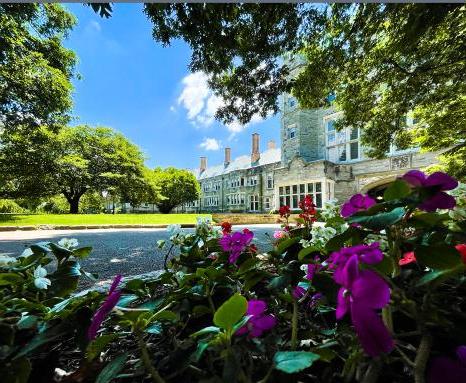Obiettivi di apprendimento
First Year Language and Culture
ITAL 000 Level
- Language instruction is based on in-class interaction: fluency will be acquired through active, embodied learning; problem-solving activities; and mimetic/gestalt applications that precede comprehension. An essential goal is to develop a learning routine outside of class (task-based activities, homework, and departmental events) to cultivate language and culture beyond class meetings
- To understand and comment on aspects of Italian culture and current events directly in Italian
- After acquiring “survival skills” in the language, students will improve their ability to autonomously speak and write in Italian at a more sophisticated level on various topics, from basic routine tasks to popular, historical, and practical aspects of Italy’s transnational culture
Second Year Language and Culture
ITAL 100 Level (Intermediate Italian Through Culture I and II)
- Building on existing skills in Italian, increase confidence and ability to read, write, speak, understand the language, introduce refined lexical terms, complex grammatical structures, and challenging cultural authentic material
- Students will be exposed to, and be able to understand, literary, cultural, and cinematic texts that can facilitate transition towards 200 level content courses
- Students will gain an appreciation for many aspects of Italian culture in its broad spectrum and will be able to communicate orally and in writing in a wide variety of topics
- Students will be prepared to be catapulted in the junior study abroad semester/year
Third Year Literature, Culture, Cinema
ITAL 200 Level Courses in Italian
- Enable students to read and understand complex and authentic texts in Italian, also outside the realm of literature and scholarship, and to extract, synthesize, and critically comment cultural information
- Sustain prolonged and sophisticated discussions and present ideas, both written and orally, by using pertinent vocabulary and critical terminology, demonstrating a grasp of advanced structures of the Italian language
- Demonstrate an in-depth knowledge of the historical context, contemporary cultural and political landscape in Italy (including current events) through a variety of media and sources
- Write with analytic clarity by demonstrating ability to grasp abstract concepts, synthesizing them, and applying them to a variety of context.
- Students will be empowered to approach texts not as unquestionable authorities but as malleable sources of inspiration that directly invite them to action as readers, translators, and creators of content
ITAL 200 Level Courses in Translation with extra hours in Italian
- Through literary analysis and a collective discussion of relevant scholarship and contextual information, students will acquire the power to interpret foundational texts of western literature. At the same time, through the formal and sociological analysis of films and trans- historical routes of transmission, they will learn to question the reason why such texts are considered foundational, and to de-center them in a post-colonial perspective
- To contaminate backgrounds and aspirations in the macro-fields of modern, textual and visual cultures.
- Students will not only acquire foundational skills in the interpretation of European films, culture, visual art and recent scholarship. They will also, and foremost, learn how to mix and intersect those skills, and they will be empowered to use them to produce creative artifacts rooted in academic thought
- By the end of the semester, students will have acquired individual experience in the practice of translation.
Fourth Year Italian
ITAL 300 Level Courses in Italian
- Critically describe and interpret major artistic and intellectual trends, movements, and authors. Identify cultural terms and practices relevant in the Italian context
- Demonstrate detailed knowledge of a number of works of Italian literature, literary genres, and authors
- Capable of producing a well-researched, well written, and persuasively argued, extended analytical essay on a topic of their choosing
- Produce oral and written reports with suitable accuracy and confidence on cultural topics, treated both abstractly as well as concretely, by using new and specialized lexicon.
- Search and use electronic and non-electronic library resources
- By blending theoretical approaches with practical ones across disciplines, students will acquire multi- literacy skills that can be spent in the pursue of different majors in the Humanities and Arts
ITAL 300 Level Courses in translation with extra hours in Italian
- To develop familiarity with the formal and ideological traits that distinguish works from the main movements of Europe’s avant-garde and neo-avant-garde
- To experimentally develop effective analytical approaches to abstract and unreadable readings and images, and to be aware of this process by journaling about it while studying and doing research revolving around women through original research based on theoretical and historical knowledge
ITAL 398-399 (Fourth Year Senior thesis, 2 semesters)
- Acquire critical self-reflection and self-assessment skills through a writing (prewriting, drafting, and revising with attention to linguistic skills, personal style) process that includes the development and refinement of research questions, methodologies, literature reviews/bibliographies, and work plans
- Become adept at close reading of both primary and secondary sources. To make connections between disparate ideas, identify and utilize primary research to develop compelling arguments. This work is facilitated through training in library research and through the use of citation formatting techniques
- Present work in various forms not only to fellow students and faculty, but also to alumni, parents, and a broader intellectual community. Synthesize research insights.
- Acquired individual experience in multi-literacy skills that can be spent in pursuing careers in different fields in the Humanities and Arts

Contact Us
Transnational Italian Studies Department
Old Library 103
Bryn Mawr College
101 N. Merion Avenue
Bryn Mawr, PA 19010-2899
Phone: 610-526-5198
Fax: 610-526-7479
Roberta Ricci, Chair
Phone: 610-526-5048
rricci@239877.com
Katie Pidot, Academic Administrative Assistant
Phone: (610) 526-5198
kpidot@239877.com
